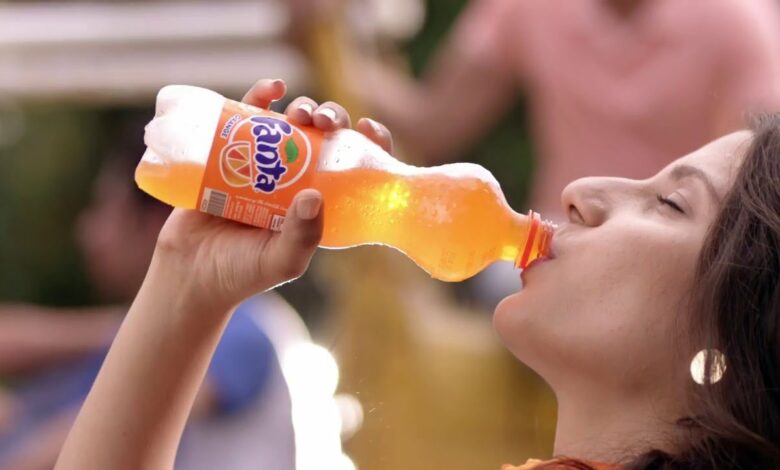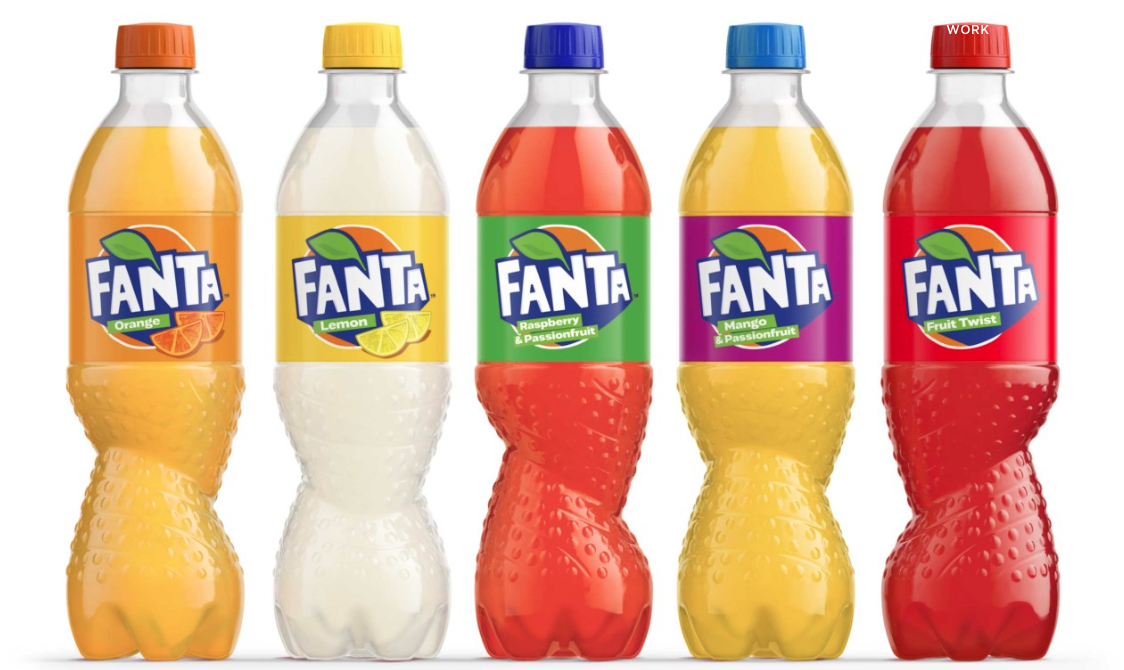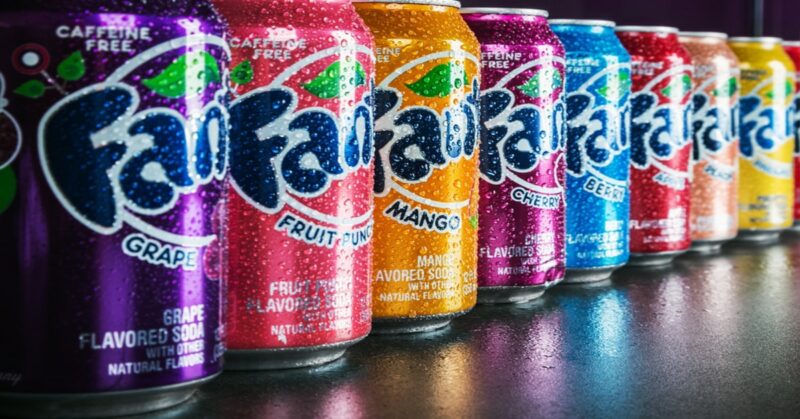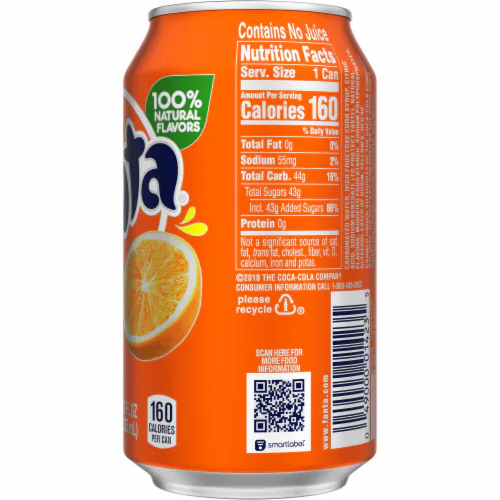Does Fanta Have Caffeine? The Truth Uncovered!

Fanta, Fanta, Fanta! The orange, the grape, the taste of childhood and youthful adventures. But what lies beneath the surface of this popular coca cola soft drink? The question that we are discussing today is does Fanta have caffeine?
For years, conflicting rumors have surrounded the soft drink, leaving many wondering: does it have caffeine? This was exactly the case with diet coke: whether it has cracked the zero sugar formula or not! To uncover the truth behind this one-time enigma, we must delve into the historical roots of the drink and assess the modern-day ingredients list, mainly comprising of high fructose corn syrup.
A Quick Explanation of Our Discussion
Yes, certain varieties of Fanta do contain caffeine. This includes the Fanta Orange and Fanta Grape flavors which both have around 25 mg of caffeine per 12 ounces.
What is Fanta?
Fanta is an iconic soft drink brand that has been around for decades, and its popularity is still going strong. First created in 1940 in Germany by the Coca-Cola Company to skirt Nazi limits on their ingredients, Fanta has gone through many iterations over the years.
Fanta Orange and Fanta Orange Zero Sugar have grown to become one of the leading orange-flavored soft drinks worldwide, and it is increasingly becoming consumer favorite.
The Caffeine Debate
A debate surrounding Fanta is whether or not it contains caffeine. While some claim there are no additives found in Fanta, others point out that almost all non-alcoholic carbonated beverages have some sort of stimulant due to their sugar content.
It’s unclear how much sugar and its subsequent effect on producing caffeine are actually found in Fanta made by coca cola.
Does Fanta Have Caffeine?
Many are perplexed by the discrepancies between different Fanta product lines and whether these flavors contain caffeine or not. In order to answer this question, the facts must be examined in more detail.
Certain Fanta product lines such as “Fanta Lemon Lime Twist” and “Fanta Fruit Punch” for instance, officially claim to have zero milligrams of caffeine. The many identical flavor variants sold throughout the world that are produced under different brand names also contain no caffeine, showing that this appears to be a standard practice across international markets.
The Exceptions

However, it is worth noting that certain other Fanta products such as “Fanta Orange Soda” do contain caffeine on the ingredients list in various countries.
While there are some controversial opinions surrounding the precise amount of Fanta caffeine content in each beverage, these variants indicate that caffeine is in fact present in the Fanta brand – though only in certain flavors.
To understand further how much energy boosting substance is present within each variant, it is necessary to investigate how much caffeine does Fanta have.
How Much Caffeine Does Fanta Have?
While some people who regularly drink coffee believe the presence of caffeine to be negligible in Fanta, others worry about its potential effects on health. It’s also worth noting that different Fanta varieties contain varying levels of caffeine, as various countries have different regulations relating to food additives and labels.
In the US, Fanta Orange Soda is known to contain 12 milligrams of caffeine per 8 fl oz (240 ml). The excessive consumption of this soft drink can lead to side-effects including headaches, dizziness, insomnia, irritability and even restlessness.
On the other hand, some may argue that this amount of caffeine is not enough to cause any such symptoms.
Fact Check
For instance, in comparison to other caffeinated beverages such as coffee, which contains 95 caffeine mg per cup (8 oz.), or a cola beverage with a potential range from 23 to 35 mg per 330 ml can respectively, Fanta does not seem to be excessively caffeinated.
That said, it is important for soda-lovers to be aware of the level of caffeine when consuming Fanta varieties for both their short-term and long-term wellbeing.
Fanta and Caffeine – In a Nutshell
We can infer that the amount of caffeine present varies from one product to another and from one country to another. Nonetheless, a general mean amount could range from 12 milligrams in the USA up to 58 milligrams in Europe.
With this in mind, it’s now time to take an even closer look at regular Fanta in particular and answer once and for all: “Does Regular Fanta Have Caffeine?”
-
According to Coca-Cola, Fanta contains up to 20mg of caffeine per 12oz can.
-
The American Beverage Association recommends limiting adults to no more than 400mg of caffeine daily.
-
A study conducted in 2016 found that energy drinks such as Fanta contain significantly higher levels of caffeine than other carbonated beverages.
Does Regular Fanta Have Caffeine?
When it comes to the question of “Does regular Fanta have caffeine?”, the answer largely depends on your geographic location. In some countries, Fanta varieties contain caffeine, while in other countries it does not.
Furthermore, different flavors of Fanta produced in the same country may contain varying levels of caffeine. It is important to consider the brand and flavor of the beverage before determining whether or not it contains any caffeine.
The Difference in Fanta Caffeine Content by Country

In some countries, such as Germany and Switzerland, regular Fanta does contain caffeine. On average, a 12-ounce bottle of original German Fanta Orange from Coca-Cola Schweiz AG will contain 25 milligrams of caffeine.
In addition to caffeine, this version of Fanta has also been found to include other stimulant ingredients like guarana extract, which will slightly increase the overall level of caffeine present in the beverage.
Meanwhile, other countries produce regular Fanta varieties that do not have any added caffeine. For instance, in an analysis of a standard US version of Fanta Orange and Fanta Orange Zero Sugar, it was found that the beverages did not contain any measurable amounts of added caffeine.
Also, within the United States, diet versions and specialty flavors are more likely to have significant levels of added caffeine ranging between 5–21 milligrams per serving.
Overall, the debate over whether regular Fanta from coca cola has caffeine or not could imply additional significance about cultural differences around consumption and regulatory standards for beverages containing stimulants.
In Australia, for example, “Fanta Orange” contains 25 milligrams of caffeine per 250ml can. The manufacturer’s website does not specify the exact amount but states that “it may contain traces of caffeine are natural flavors from natural sources.”
In Japan, apart from citric acid, some of the Fanta flavors still include caffeine as an ingredient. Those drinks, including “Fanta Citrus Coffee” and “Fanta Yamazaki Cherry Lemon Caffeine” seem to be marketed as caffeinated beverages with a citrus fruit flavor.
The Health Issues
While some consumers argue that Fanta with added caffeine would entice healthier drink options among young adults, there are concerns that this alternative could contribute to even more incidents of underaged drinking and health problems associated with too much caffeine consumption.
On the other hand, proponents of added caffeine argue that less sugar and more nutrients will create a healthier version of Fanta.
With fewer calories and less artificial sugars, those who enjoy Fanta could reduce their risk for developing diabetes and heart disease by consuming these almost calorie free altered versions in moderation.
In The Hands of Consumers
Ultimately, it is up to the individual consumer to be aware whether their chosen beverage has any added caffeine or not prior to consumption.
The difference in caffeine content by country is a crucial factor affecting the debate surrounding regular Fanta and its potential for containing added caffeinated ingredients.
The next section will further explore this concept by investigating what types of Fanta varieties exist globally and how much these products normally contain in terms of total caffeine content per serving.
In-Depth Research Needed
To answer the question: is Fanta caffeine free or not requires further research into the specific ingredients used in the production process for each location where the beverage is produced.
But no matter which side one supports in the debate, it is clear that what counts as a safe level of caffeine intake varies from country to country.
This leads us to our next section about: “Is Fanta Energize a Caffeine-Free Option?”.
Is Fanta Energize a Caffeine-Free Option?
Though Fanta Energize is marketed as a caffeine-free version of the popular soft drink, critics have argued that it may still contain trace amounts.
Studies conducted by laboratory testing companies have shown that while large doses of caffeine are not present in Fanta Energize, dependent on the flavor variation and country of origin there could be trace or even larger amounts than what’s present in many energy drinks.
The Findings
The latest findings suggest that fans of the beverage can relax a bit as it’s not likely to cause any type of long-term health implications due to the small amount that could potentially be present.
However, those who rely heavily on caffeine to stay awake or energized should steer clear of Fanta Energize, or at least test it first before consuming large portions of the carbonated soft drink.
It’s important to note that countries such as Australia were successful in pushing for complete caffeine-free versions which could offer some peace of mind to those seeking a healthier alternative to other caffeinated beverages.
Digging Deeper
As we learn more about this popular beverage, we must also consider nutritional value and other nutrition facts. With that said, let’s now take a look at what other elements make up these carbonated sugary drinks.
Fanta Nutritional Facts

What else is in Fanta other than sugar and caffeine? The popular soft drink has some other nutrition facts worth mentioning.
One 12-ounce can of Fanta contains 140 calories, all of which come from the 42 grams of sugar that each can contains – a staggering amount when you consider that a teaspoon of sugar equals 4 grams.
Fanta also contains 46 milligrams of sodium and 38 milligrams of potassium, trace amounts of Riboflavin and Niacin, and 45 milligrams of Vitamin C.
The Obvious Concerns
When considering all these ingredients, it is understandable why some people feel concerned about their health when consuming Fanta.
Still, there are those who think that one can drink Fanta on a regular basis without suffering any consequences, as long as they practice moderation.
After all, Fanta contains only 42 grams of sugar per 12 ounces, which is much less than the average energy drink—which can contain up to 80 grams per serving.
Nevertheless, it is important for consumers to be aware that drinking too much Fanta can have an adverse effect on their health due to its high sugar content.
Too much sugar can lead to weight gain, insulin resistance, and hypertension. In addition, excessive consumption of Vitamin C may cause digestive issues like abdominal pain, diarrhea and nausea.
Despite the potential consequences associated with drinking too much soft drinks like Fanta, some light-heartedness must be injected in this discussion.
After all, I think we can all agree that everyone enjoys a refreshing glass of Fanta now and then!
Also, check out – Does the Pink Drink have caffeine
Common Questions and Responses
Does Fanta have any caffeine-free options?
Yes, Fanta offers a number of caffeine-free options. The regular Fanta orange and other varieties of citrus-flavored sodas from the brand are all caffeine-free.
Similar to diet coke, Fanta has manufactured diets and caffeine-free sodas, such as Diet Fanta Vanilla, Diet Fanta Orange, and Diet Fanta Raspberry.
As an alternative to orange flavor soda, Fanta also manufactures fruit juice that is naturally caffeine-free, like its Pomegranate Blueberry and Fruit Punch flavors.
How much caffeine is in an average can of Fanta?
An average can of Fanta typically contains around 35mg of caffeine amount. This amount of caffeine mg is much lower than what you would find in a cup of coffee, which has 95mg of caffeine on average, or a can of cola, which has around 40mg.
This makes Fanta the ideal choice for those looking for a slightly sweet and bubbly drink without the caffeinated buzz. There have also been reports of cans containing as low as 10mg of caffeine, so it’s important to check the label if you are unsure.
Do all Fanta flavors contain caffeine?
No, not all Fanta flavors contain caffeine. While some Fanta soft drinks do contain up to 10 milligrams of caffeine per 12 fluid ounces, other popular flavor have no caffeine content.
This includes Fanta Orange Zero, as well as many of the non-cola fruit juice flavors such as Fanta Fruit Punch and Fanta Grape. It is important to check the nutritional facts on any fruit juice like Fanta Grape and other products you purchase in order to verify or confirm whether there is Fanta caffeine content or not.
Conclusion
The answer to the question “Does Fanta have caffeine?” is that it depends on where you live in the world and what type of Fanta beverage you choose.
In the US, the Coca-Cola Company officially states that no Fanta products contain caffeine, while in some other countries like Australia, caffeine, along with high fructose corn syrup, carbonated water, and sodium benzoate, is an ingredient in certain types of Fanta.
The inclusion of caffeine is likely a marketing strategy of coca cola to position Fanta as an alternative to caffeinated drinks such as orange Fanta soda.
Go Caffeine-Free
Ultimately, if you are looking for a way to avoid caffeine, then it’s best to check the ingredients labels when purchasing Fanta beverages and stick with brands that advertise themselves as ‘caffeine-free’.
However, at the end of the day, the choice comes down to personal preference.
So, if you enjoy a nice fizzy drink but want to avoid too much sugar or calories, Fanta could be a viable choice for you regardless of whether or not it contains caffeine.